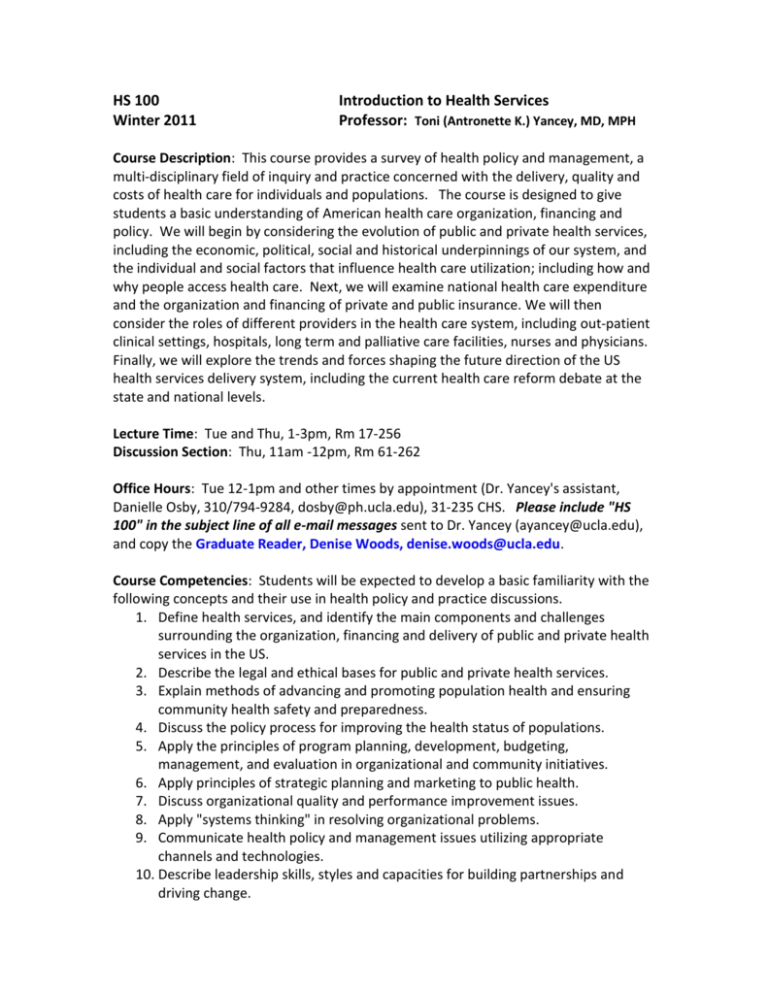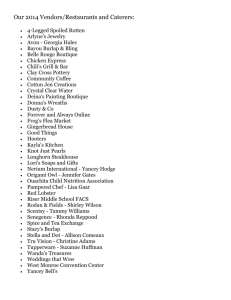HS 100 - (Toni) Yancey
advertisement

HS 100 Winter 2011 Introduction to Health Services Professor: Toni (Antronette K.) Yancey, MD, MPH Course Description: This course provides a survey of health policy and management, a multi-disciplinary field of inquiry and practice concerned with the delivery, quality and costs of health care for individuals and populations. The course is designed to give students a basic understanding of American health care organization, financing and policy. We will begin by considering the evolution of public and private health services, including the economic, political, social and historical underpinnings of our system, and the individual and social factors that influence health care utilization; including how and why people access health care. Next, we will examine national health care expenditure and the organization and financing of private and public insurance. We will then consider the roles of different providers in the health care system, including out-patient clinical settings, hospitals, long term and palliative care facilities, nurses and physicians. Finally, we will explore the trends and forces shaping the future direction of the US health services delivery system, including the current health care reform debate at the state and national levels. Lecture Time: Tue and Thu, 1-3pm, Rm 17-256 Discussion Section: Thu, 11am -12pm, Rm 61-262 Office Hours: Tue 12-1pm and other times by appointment (Dr. Yancey's assistant, Danielle Osby, 310/794-9284, dosby@ph.ucla.edu), 31-235 CHS. Please include "HS 100" in the subject line of all e-mail messages sent to Dr. Yancey (ayancey@ucla.edu), and copy the Graduate Reader, Denise Woods, denise.woods@ucla.edu. Course Competencies: Students will be expected to develop a basic familiarity with the following concepts and their use in health policy and practice discussions. 1. Define health services, and identify the main components and challenges surrounding the organization, financing and delivery of public and private health services in the US. 2. Describe the legal and ethical bases for public and private health services. 3. Explain methods of advancing and promoting population health and ensuring community health safety and preparedness. 4. Discuss the policy process for improving the health status of populations. 5. Apply the principles of program planning, development, budgeting, management, and evaluation in organizational and community initiatives. 6. Apply principles of strategic planning and marketing to public health. 7. Discuss organizational quality and performance improvement issues. 8. Apply "systems thinking" in resolving organizational problems. 9. Communicate health policy and management issues utilizing appropriate channels and technologies. 10. Describe leadership skills, styles and capacities for building partnerships and driving change. Course Requirements: Student performance in this course will be evaluated by: 1. Participation in class discussions of the readings. Students must be prepared to present summaries of assigned readings or informed viewpoints on issues arising during discussions (10%). 2. Abstracts of two of the readings--one page each--assigned to each student to be presented and submitted during discussion section (30%). 3. Two in-class Midterm Examinations, including multiple choice, true-false, shortanswer, and essay questions (1st 20%, 2nd 40%). Required Readings: 1. Andersen R, Rice TH, Kominski GF. Changing the U.S. Health Care System: Key issues in health services policy and management, 3rd ed., San Francisco, CA: Jossey-Bass, 2007. Available from the UCLA Health Sciences bookstore. ISBN 978-078798524-0 2. Other readings, including journal articles, book chapters, newspaper articles and policy briefs, will be available on the class website accessed at ccle.ucla.edu. Readings are subject to change—please check the website at least weekly. Putting Promotion into Practice: A 10-minute Instant Recess break will be included in each class. Participation is voluntary! Please wear clothing that permits low-impact physical activity. Week 1 Tue, Jan 4 - Course introduction and overview Speaker: Yancey Reading(s): Changing the US Health Care System, Introduction and Overview Thu, Jan 6 - Framework for the organization of health services: Historical and contemporary developments Speaker: Yancey Reading(s): Novick LF, Morrow CB. Mays GP, Public Health Administration: Principles for PopulationBased Management, 2nd Ed., Sudbury, MA: Jones & Bartlett Publishers, Chs 1, 2 Week 2 Tue, Jan 11 - Health disparities Speaker: Yancey Reading(s): Changing the US Health Care System, Chs 2, 3 Thu, Jan 13 - Organization of government public health services Speaker: Yancey Reading(s): Changing the US Health Care System, Ch 21 2 Fielding JE, Briss PA. Promoting evidence-based public health policy: can we have better evidence and more action? Health Aff 2006 Jul-Aug;25(4):969-78. Fielding JE, Luck J, Tye G. Reinvigorating public health core functions: Restructuring Los Angeles County’s public health system. J Public Health Management Practice 2003;9(1):7-15. Yancey AK, Fielding JE, Flores GF, Sallis JF, McCarthy WJ, Breslow L. Creating a robust public health infrastructure for physical activity promotion: a challenge to chronic disease control policy. Am J Prev Med 2007;32(1);68-78. Week 3 Tue, Jan 18 - The public's role in the health system--community engagement and advocacy Case Study: Tobacco control and implications for obesity prevention in the US Speaker: McCarthy Reading(s): Brownell, KD, Warner, KE. The perils of ignoring history: Big Tobacco played dirty and millions died. How similar is Big Food? Milbank Q 2009;87(1):259-294. Davis RM, Wakefield M, Amos A, Gupta PC. The hitchhiker’s guide to tobacco control: A global assessment of harms, remedies and controversies. Ann Rev Pub Hlth 2007; 28:171-194. Emery SL, Szczypka G, Powell LM, Chaloupka FJ. Public health obesity-related TV advertising: Lessons learned from tobacco. Am J Prev Med 2007 Oct;33(4 Suppl):S257-63. Messer K, Pierce, JP, Zhu SH, Hartman AM, Al-Delaimy WK, Trinidad DR, et al. The California tobacco control program's effect on adult smokers: (1) smoking cessation. Tob Control 2007;16(2):85-90. McCarthy WJ, Mistry R, Lu Y, Patel M, Zheng H, Dietsch B. Density of tobacco retailers near schools: Effects on tobacco use among students. Am J Pub Health 2009; 99:2006-2013 Thu, Jan 20 - Health insurance Speaker: Wortham Reading(s): Changing the US Health Care System, Ch 17 Iglehart JK. Medicaid revisited--skirmishes over a vast public enterprise. N Engl J Med 2007;356:734-40. Ziller EC, Coburn AF, McBride TD, Andrews C. Patterns of individual health insurance coverage, 1996–2000. Health Aff 2004;23(6):210-221. Week 4 Tue, Jan 25 - Health care costs and financing Speaker: Kominski Reading(s): Changing the US Health Care System, Chs 5, 6, 7 3 Goetzel RZ, Shechter D, Ozminkowski RJ, Stapleton DC, Lapin PJ, McGinnis JM, Gordon CR, Breslow L. Can health promotion programs save Medicare money? Clin Interv Aging 2007;2(1):117-22. Thu, Jan 27 - Health care access and utilization Speaker: Schweitzer Reading(s): Changing the US Health Care System, Chs 1, 4, 7 Week 5 Tue, Feb 1 - Primary care services and disparities in care Speaker: Ortega Reading(s): Changing the US Health Care System, Chs 3, 11, 16 Vargas-Bustamante A, Fang H, Rizzo JA, Ortega AN. Understanding observed and unobserved health care access and utilization disparities among US Latino adults. Medical Care Res Rev 2009;66(5):561-577. Thu, Feb 3 - Abstract Presentations/Midterm Review (NO Discussion Section) Week 6 Tue, Feb 8 - Managed care and health information systems Speaker: Roby Reading(s): Changing the US Health Care System, Chp 19 Rodriguez HP, Von Glahn T, Rogers WH, Safran DG. Organizational and market influences on physician performance on patient experience measures. Health Serv Res 2009;44(3):880-901. (REQUIRED) Fisher ES, Shortell SM. Accountable Care Organizations: Accountable for What, to Whom, and How. JAMA 2010 Oct 10: (304(15): 1715-1716) Robinson JC. The End of Managed Care. JAMA 2001; 285: 2622 - 2628 Thu, Feb 10. MIDTERM I Week 7 Tue, Feb 15 - Health professions and secondary and tertiary care, including RN shortage 4 Speaker: TBA Reading(s): Changing the US Health Care System, Chs 8, 9, 23 Thu, Feb 17 - Long-term and palliative care Speaker: Pourat Reading(s): Changing the US Health Care System, Ch 13 Kane RL, Kane RA. What older people want from long-term care, and how they can get it. Health Aff 2001;20(6):114-127. Week 8 Tue, Feb 22 - Health policy primer Speaker: Yancey Reading(s): Berkman L, Kawachi I. Social Epidemiology. NY, NY: Oxford University Press, 2000. Heymann SJ, Health and social policy, Ch 16. Brownson RC, Royer C, Ewing R, McBride TD. Researchers and policymakers: travelers in parallel universes. Am J Prev Med 2006 Feb;30(2):164-72. Brownson RC, Chriqui JF, Stamatakis KA. Understanding evidence-based public health policy. Am J Public Health 2009 Sep;99(9):1576-83. Cole BL, Fielding JE. Health impact assessment: a tool to help policy makers understand health beyond health care. Annu Rev Public Health 2007;28:393-412. Thu, Feb 24 - Regulation, quality assurance and ethics Speaker: Needleman Reading(s): Changing the US Health Care System, Ch 12 Phoebe, Lindsey & Barton (eds). Understanding the US Health Services System, 3rd ed. Chicago: Health Administration Press, 2007, Ch 8. Week 9 Tue, Mar 1 - Multi-sectoral collaboration in advancing the public's health Speaker: Yancey Reading(s): Margolin FS, Hasnain-Wynia R, Torres GW, Pittman MA. The value of collaboration in eliminating barriers to preventive care and screening among underserved populations. J Ambul Care Manage 2004;27(4):339-47. Ockene JK, Edgerton EA, Teutsch SM et al. Integrating evidence-based clinical and community strategies to improve health. Am J Prev Med 2007;32(3):244-52. Pearson SD, Lieber SR. Financial penalties for the unhealthy? Ethical guidelines for holding employees responsible for their health. Health Aff 2009;28:845-52. Yancey, AK. Organizational leadership is the key ingredient in getting society moving, literally! Prev Med 2009;49:342-51. 5 Thu, Mar 3 - Health promotion and primordial, primary, secondary and tertiary disease prevention Speaker: Yancey Reading(s): Breslow L. From disease prevention to health promotion. JAMA 1999; 281:1030-3. Breslow L. Why health promotion lags knowledge about healthful behavior. Am J Health Promot 2001;15(5):388-90. Breslow L. Perspectives: The third revolution in health. Ann Rev Pub Health 2004;25: xiii-xviii. Breslow L. Health measurement in the third era of health. Am J Public Health 2006; 96(1):17-19. Yancey A. Facilitating health promotion in commmunities of color. Cancer Res Ther Contr 1999;8:113-22. Week 10 Tues, Mar 8 - Health Reform: Will It Survive? Speaker: Kominski Reading(s): Changing the US Health Care System, Chs 4, 15 Thu, Mar 10 - MIDTERM II 6





